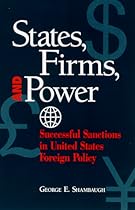States, Firms and Power: Successful Sanctions in United States Foreign Policy (Suny Series in Global Politics (Paperback))

| Author | : | |
| Rating | : | 4.95 (588 Votes) |
| Asin | : | 0791442721 |
| Format Type | : | paperback |
| Number of Pages | : | 320 Pages |
| Publish Date | : | 2013-06-08 |
| Language | : | English |
DESCRIPTION:
George E. He is coeditor, with J. Samuel Barkin, of Anarchy and the Environment: The International Relations of Common Pool Resources, also published by SUNY Press.. Shambaugh is Assistant Professor of International Affairs and Government at Georgetown University
government s attempts to impose its will on its trading partners in these areas. Kim Richard Nossal, McMaster University State, Firms, and Power addresses an important issue area, and provides interesting and relevant case studies. The case studies are very detailed and for that reason are likely to be cited as the authoritative works on the U.S. In this last sense it represents an emerging research style in international relations. It is also thoughtful and scholarly, providing both qualitative and quantitative analysis. Jonathan Kirshner, Cornell University"
Shambaugh uses a theory of economic statecraft to analyze the sources and limitations of power relations between states and firms. Understanding when and why economic statecraft works provides insights into the nature and exercise of power in world politics that can, in turn, guide policy-makers in their use of sanctions and incentives against friends, foes, and firms.. sanctions in the energy, computer, and telecommunications industries in the 1980s, and current U.S. States, Firms, and Power uncovers the workings behind frequently maligned and often misapplied economic sanctions and incentives that have emerged as the United States policy tools of choice. The book features a statistical analysis of 66 sanction episodes since 1949, including detailed case studies of U.S. sanctions against foreign companies conducting business in Cuba, Iran, and Libya
Good contribution to the literature A Customer With the available tools of influence and power declining--and the need for being able to wield such instruments on the rise--this book provides good insights as to the "whys" of effectiveness. The U.S. will increasingly face assymetric threats that hinge on others being able to access goods and technology. Shambaugh's book provides a richer understanding of the costs and benefits of appying sanctions, particularly in terms . New Insights on the Implications of Sanctions A Customer This book is a timely contribution to the foreign policy landscape. As the need for the U.S. to be able to influence actors and control technologies is on the rise, its tools to wield such influence are increasingly circumscribed. It's good to see a richer analysis of the "whys" of effectiveness of sanctions and incentives, particularly as they relate to firms.
